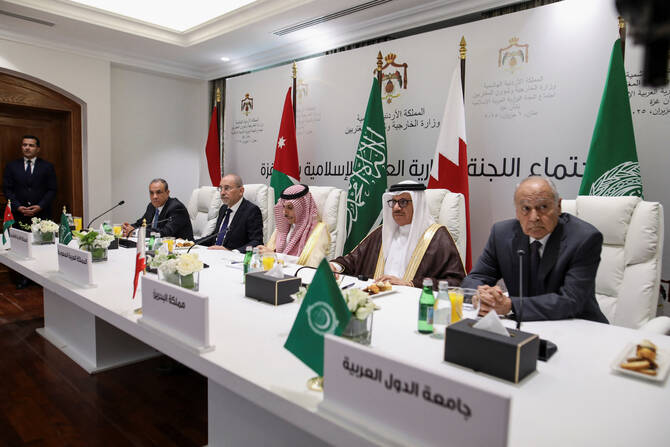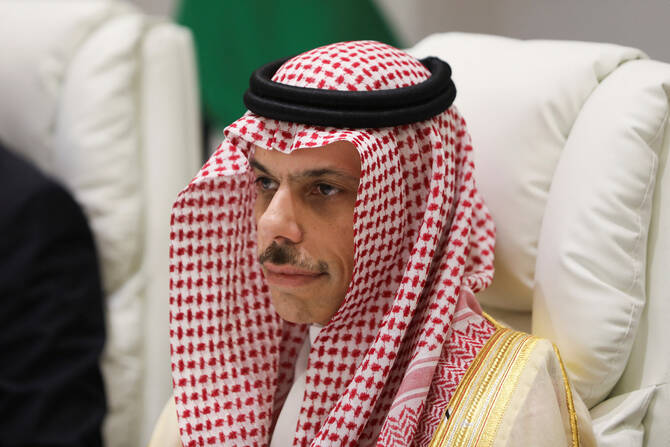CAIRO: Saudi Arabia’s Foreign Minister Prince Faisal bin Farhan said the Israeli government’s refusal to allow Arab ministers to the occupied West Bank showed its “extremism and rejection of peace.”
His statements came during a joint press conference with counterparts from Jordan, Egypt, and Bahrain in Amman.
The Arab ministers condemned what they described as the “arrogant” Israeli decision to ban them from visiting the West Bank and its rejection of any peace efforts.
Members of the Ministerial Committee assigned by the Joint Extraordinary Arab-Islamic Summit on Gaza met with Jordan’s King Abdullah II in Amman earlier today to discuss ceasefire efforts in the Gaza Strip and a post-war plan.
During their meeting at Al-Husseiniya Palace, King Abdullah and the ministers stressed the importance of international support for Palestinians to secure their rights and achieve peace through a two-state solution.
The Ministerial Committee, which consists of the foreign ministers from Saudi Arabia, Egypt, Jordan, and Bahrain, along with the Secretary-General of the Arab League, held a video conference meeting in Amman on Sunday with Palestinian President Mahmoud Abbas and his deputy, Hussein Al-Sheikh, and Mohammad Mustafa, the prime minister and minister of foreign affairs.
Ayman Al-Safadi, Jordan’s Foreign Minister, said that the “Israeli government continues to kill all the chances of peace in the region” after the committee visit was blocked on Saturday.
Prince Faisal bin Farhan echoed these sentiments and added that the Palestinian Authority continued to carry out its duties while facing a party that did not want any solutions.
Egyptian Foreign Minister Badr Abdelatty told Jordan News Agency that Jordan and Egypt will strongly confront all Israeli plans to displace Palestinians from the Gaza Strip and the West Bank.
On Saturday, Israel said it will not allow a planned meeting on Sunday in the Palestinian administrative capital of Ramallah to go ahead.
The ministers also discussed preparations for a high-level international peace conference in New York this June, co-chaired by Saudi Arabia and France, aimed at advancing the two-state solution based on 1967 borders with East Jerusalem as the Palestinian capital.
The committee reaffirmed support for ceasefire efforts led by Egypt, Qatar, and the US, and urged Israel to allow unrestricted humanitarian access and cease its escalation in the West Bank.
It also emphasized the importance of a Gaza reconstruction conference in Cairo following a ceasefire.
The ministers condemned Israel for blocking their planned visit to Ramallah, calling it a violation of diplomatic norms.
President Abbas welcomed the committee’s efforts, reiterated his government’s commitment to reform, peace, and non-violence, and called for international support and the release of withheld Palestinian funds.





















